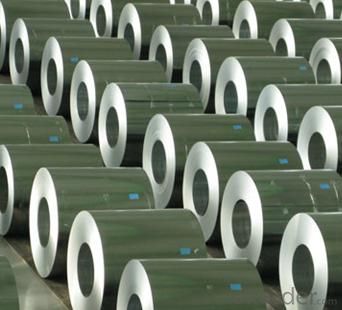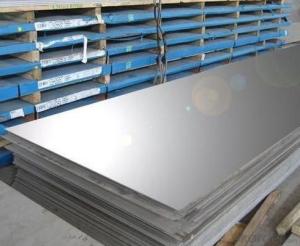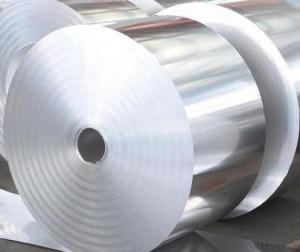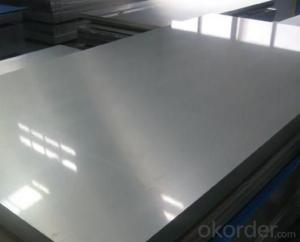Electro- Galvanized Steel Sheet in Coils
- Loading Port:
- Tianjin
- Payment Terms:
- TT OR LC
- Min Order Qty:
- 25 m.t.
- Supply Capability:
- 5000 m.t./month
OKorder Service Pledge
OKorder Financial Service
You Might Also Like
1.Structure of Electro- Galvanized Steel Sheet in Coils Description:
Hot-dip galvanized steel coils are available with a pure zinc coating through the hot-dip galvanizing process. It offers the economy, strength and formability of steel combined with the corrosion resistance of zinc. The hot-dip process is the process by which steel gets coated in layers of zinc to protect against rust. It is especially useful for countless outdoor and industrial applications. Production of cold formed corrugated sheets and profiles for roofing, cladding, decking, tiles, sandwich walls, rainwater protective systems, air conditioning duct as well as electrical appliances and engineering.
2.Main Features of the Electro- Galvanized Steel Sheet in Coils:
• Excellent process capability
• Smooth and flat surface
• Workability, durability
• Excellent anticorrosive property
• High strength
• Good formability
• Good visual effect
3.Electro- Galvanized Steel Sheet in Coils Images

4.Electro- Galvanized Steel Sheet in Coils Specification
Standard: ASTM, JIS,EN
Grade: CS, DX51D+Z,SGCC, SS 230~550,S220GD+Z~S550GD+Z, SGC340~SGC570
Thickness: 0.1mm~5mm
Width: max 2000mm
Coil weight:3-12 MT
Coil ID:508/610mm
Surface structure: zero spangle, regular spangle or minimum spangle
Surface treatment: Chromate treatment, Oiled/dry, skinpassed/non-skinpassed
Packing: Standard seaworthy export package
Technology test results:
Processability | Yield strength | Tensile strength | Elongation % | 180°cold-bending |
Common PV | - | 270-500 | - | d=0,intact,no zinc removal |
Mechanical interlocking JY | - | 270-500 | - | d=0,intact,no zinc removal |
Structure JG | >=240 | >=370 | >=18 | d=0,intact,no zinc removal |
Deep drawn SC | - | 270-380 | >=30 | d=0,intact,no zinc removal |
EDDQ SC | - | 270-380 | >=30 | d=0,intact,no zinc removal |
5.FAQ of Electro- Galvanized Steel Sheet in Coils
We have organized several common questions for our clients,may help you sincerely:
1.How about your company?
A world class manufacturer & supplier of castings forging in carbon steel and alloy steel,is one of the large-scale professional investment casting production bases in China,consisting of both casting foundry forging and machining factory. Annually more than 8000 tons Precision casting and forging parts are exported to markets in Europe,America and Japan. OEM casting and forging service available according to customer’s requirements.
2.How to guarantee the quality of the products?
We have established the international advanced quality management system,every link from raw material to final product we have strict quality test;We resolutely put an end to unqualified products flowing into the market. At the same time, we will provide necessary follow-up service assurance.
3. How long can we receive the product after purchase?
Usually within thirty working days after receiving buyer’s advance payment or LC. We will arrange the factory manufacturing as soon as possible. The cargo readiness usually takes 15-30 days, but the shipment will depend on the vessel situation.
- Q:How are steel coils protected against fire and heat?
- To ensure the safety of steel coils, various methods are used to protect them from fire and heat. One effective way is by applying a fire-resistant coating, which acts as a barrier between the steel surface and the heat source. This coating prevents direct contact and reduces the chances of ignition or damage. Aside from coatings, steel coils can also be stored in fire-resistant warehouses or storage facilities. These structures are built with fire-resistant materials like concrete or steel and equipped with fire suppression systems such as sprinklers or fire extinguishers. These measures help contain and suppress any potential fire, effectively limiting its spread and safeguarding the steel coils. Furthermore, facilities that handle steel coils often implement fire safety protocols and procedures. These may include regular fire drills, training programs for employees on fire prevention and response, and the installation of fire safety equipment like fire alarms and fire hoses. These measures ensure that any fire incidents can be quickly detected and addressed, minimizing the risk to the steel coils. Overall, protecting steel coils against fire and heat involves a combination of fire-resistant coatings, proper storage in fire-resistant structures, and the implementation of fire safety protocols. These measures work together to mitigate the risk of fire and heat-related damage, ensuring the integrity and safety of the steel coils.
- Q:What are the different types of coil leveling machines?
- There are several different types of coil leveling machines used in various industries. Some of the most common types include: 1. Precision Roll Levelers: These machines are highly accurate and capable of leveling coils with high precision. They use a series of rolls to apply pressure and remove any distortions or imperfections in the coil. 2. Straighteners: Straighteners are used to flatten coils that have become curved or warped during the manufacturing process. They typically consist of a set of rollers that gradually bend the coil in the opposite direction to restore its flatness. 3. Rotary Levelers: Rotary levelers are used to level coils that are thicker or have a higher yield strength. They utilize a series of rolls that rotate in opposite directions to apply pressure and flatten the coil. 4. Tension Levelers: Tension levelers are commonly used for leveling thin-gauge coils. They work by applying tension to the coil while passing it through a series of rollers. This process helps to remove any waviness or unevenness in the coil. 5. Stretch Levelers: Stretch levelers are specifically designed to level coils made of high-strength materials. They use a combination of stretching and bending to remove any irregularities in the coil's surface. 6. Cut-to-Length Lines: These machines not only level the coil but also cut it into specific lengths as per the customer's requirements. They are commonly used in industries where precision and customization are essential, such as automotive or construction. Overall, the choice of coil leveling machine depends on factors such as the type and thickness of the coil, desired level of accuracy, and the intended application of the leveled coil.
- Q:Ik iron was too heavy but could steel bolts have been used. I can see iron dissolving at surface when to be a danger it needs to reach the core of sun.. But so does steel go deeper in(w.e alloy turned from iron)..I wanna know which would be worse iron..or upgraded iron(steel) and if the steel would have worse effects than normal iron..Im sure if we used iron we used steel
- Steel might have been used in some bolts sure. But.....are you under the impression that Ulysses was ever intended to crash into the Sun or something? You know it wasn't right? It was launched (in the 1980's) to study the Sun. But....uh.....not by crashing into it. Ulysses was even sent out to use Jupiter as a gravitational assist. We are closer to the Sun than Ulysses is..... Even if it did go crash into the Sun though there is absolutely no way that ANY material, natural or manmade, could survive intact all the way to the core of a star. It takes photons of LIGHT something like 100,000 years just to make it out from the core of the Sun to the surface because it is so dense. How do you propose a metal probe making it back the other way? Would it have worse effects than what? The effects, no matter what it was made out of, would be that as it got CLOSE to the Sun it would vaporize. No matter what it was made out of though it would have no affect whatsoever on the Sun. Every single element, without exception, that exists on the Earth and everywhere else in our solar system also exists in the Sun already, in far greater quantities. The planets and Sun all formed out of the same nebula at the same time. The Sun just got massive enough that fusion began and it became a star. There is already more iron in the Sun than there is everything on Earth. If you took every single atom of every element there is on the Earth it would still not add up to even a fraction of the total amount of iron in the Sun.
- Q:What is the yield strength of steel coils?
- The yield strength of steel coils can vary depending on the specific grade and composition of the steel. However, on average, the yield strength of steel coils typically ranges from 250 to 350 megapascals (MPa).
- Q:What is the cost of steel coils?
- The cost of steel coils can vary depending on factors such as the type of steel, the thickness and size of the coils, and market conditions. It is best to contact suppliers or check current market prices for accurate cost information.
- Q:What are the different types of steel coil surface finish treatments?
- There are several different types of steel coil surface finish treatments available, each serving a specific purpose and providing unique characteristics. Some common types include: 1. Hot Rolled: This is the most basic and common type of steel coil surface finish treatment. It involves heating the steel above its recrystallization temperature and then rolling it to achieve the desired thickness. This process results in a rough surface texture. 2. Cold Rolled: Unlike hot rolled, cold rolled steel coil undergoes a process where it is rolled at room temperature. This treatment produces a smoother surface finish with improved dimensional accuracy and tighter tolerances. 3. Galvanized: Galvanization is a process where a protective zinc coating is applied to the steel coil surface. This treatment not only enhances the appearance but also provides excellent corrosion resistance, making it suitable for outdoor applications. 4. Electro-galvanized: Similar to galvanized steel, electro-galvanized steel coil is coated with a zinc layer. However, the coating is applied through an electroplating process, resulting in a thinner and more controlled coating. 5. Pre-painted: Pre-painted steel coil surface finish treatment involves applying a layer of paint or other protective coating before the product is delivered to the customer. This treatment enhances the appearance and provides additional protection against corrosion. 6. Stainless Steel: Stainless steel coil surface finish treatment involves passivating the steel to remove any impurities or contaminants on the surface. This process improves the resistance to corrosion and gives the steel a clean and smooth appearance. 7. Embossed: Embossing is a surface finish treatment where a pattern or design is pressed into the steel coil surface. This treatment enhances the aesthetics of the product and can provide additional grip or texture depending on the specific design. 8. Brushed: Brushing is a treatment where a fine abrasive material is used to create a brushed pattern on the steel coil surface. This finish provides a unique texture and can help mask scratches or other imperfections. These are just some of the various types of steel coil surface finish treatments available. The choice of treatment depends on the specific requirements of the application, such as appearance, corrosion resistance, or functionality, and it is important to select the most appropriate treatment to ensure the desired outcome.
- Q:I am buying my boyfriend a steel guitar for our one year anniversary and I was curious what brand or company I should look into. I want something high quality yet traditional. Money is not really an issue but I don't exactly want to spend an arm and a leg either.Thank you in advance!
- Did Steel Guitar stand for guitar string ? If yes, there's many brand provide quality guitar string and also be famous brand. you can buy such as D'addario, Errnie ball, GHS, Blue Steel. One more tips, for standard string gauge, if you want to surprise your boyfriend, buy .9 or .10 gauge set. This string set suitable for standard guitar, He'll be more happy if you give him 1 pack of string, buy if it over your price range, just 1 set is ok, haha. Happy Anniversary, Es. ;)
- Q:How are steel coils tested for dimensional accuracy?
- Steel coils are tested for dimensional accuracy using various methods such as measuring the width, thickness, and length of the coils. This can be done through manual measurement using measuring tapes or calipers, or with the help of advanced technologies like laser-based sensors or non-contact measurement systems.
- Q:I have a bottle like this* Can u make hot chocolate in it. Can i heat it.I wanna take hot Chocolate to school
- Stainless okorder /... on Hot Drink in Stainless Steel Water Bottle.
- Q:What are the different types of steel coil edge treatments?
- There are several different types of steel coil edge treatments used in the manufacturing and processing of steel coils. These treatments are done to enhance the edge quality, protect against damage, and facilitate handling and processing of the coils. Some of the common types of steel coil edge treatments include: 1. Mill Edge: This is the standard edge treatment provided by the steel mill. It is the raw edge of the steel coil that has been produced during the hot rolling process. Mill edge is typically sharp and may have some irregularities. 2. Slit Edge: Slit edge is a type of edge treatment where the coil is slit to the desired width, and the edges are then processed to remove any burrs or unevenness. Slit edge coils have smoother edges compared to mill edge coils. 3. Deburred Edge: Deburring is a process that removes any sharp or rough edges from the coil. It is done using specialized equipment or techniques to create a smoother and safer edge. Deburred edges are commonly used in applications where safety and handling are critical. 4. Rounded Edge: Rounded edge treatment involves rounding the edges of the coil to reduce the risk of damage during handling and processing. This treatment is often used in applications where the coil needs to be uncoiled or fed into machinery without causing any damage. 5. Beveled Edge: Beveling is a process where the edges of the coil are chamfered or cut at an angle. Beveled edges are used in applications where easy insertion, joining, or welding of the coil is required. The beveling process also helps to improve the strength and durability of the edge. 6. Sheared Edge: Shearing is a cutting process where the coil is cut to the desired width using high-pressure blades or scissors. Sheared edge treatment provides a clean and straight edge, free from burrs or irregularities. It is commonly used in applications where precise dimensions and a smooth edge are required. These are just a few of the different types of steel coil edge treatments commonly used in the industry. The choice of edge treatment depends on the specific requirements of the application, such as handling, processing, safety, and aesthetics.
1. Manufacturer Overview |
|
|---|---|
| Location | |
| Year Established | |
| Annual Output Value | |
| Main Markets | |
| Company Certifications | |
2. Manufacturer Certificates |
|
|---|---|
| a) Certification Name | |
| Range | |
| Reference | |
| Validity Period | |
3. Manufacturer Capability |
|
|---|---|
| a)Trade Capacity | |
| Nearest Port | |
| Export Percentage | |
| No.of Employees in Trade Department | |
| Language Spoken: | |
| b)Factory Information | |
| Factory Size: | |
| No. of Production Lines | |
| Contract Manufacturing | |
| Product Price Range | |
Send your message to us
Electro- Galvanized Steel Sheet in Coils
- Loading Port:
- Tianjin
- Payment Terms:
- TT OR LC
- Min Order Qty:
- 25 m.t.
- Supply Capability:
- 5000 m.t./month
OKorder Service Pledge
OKorder Financial Service
Similar products
New products
Hot products
Related keywords





























